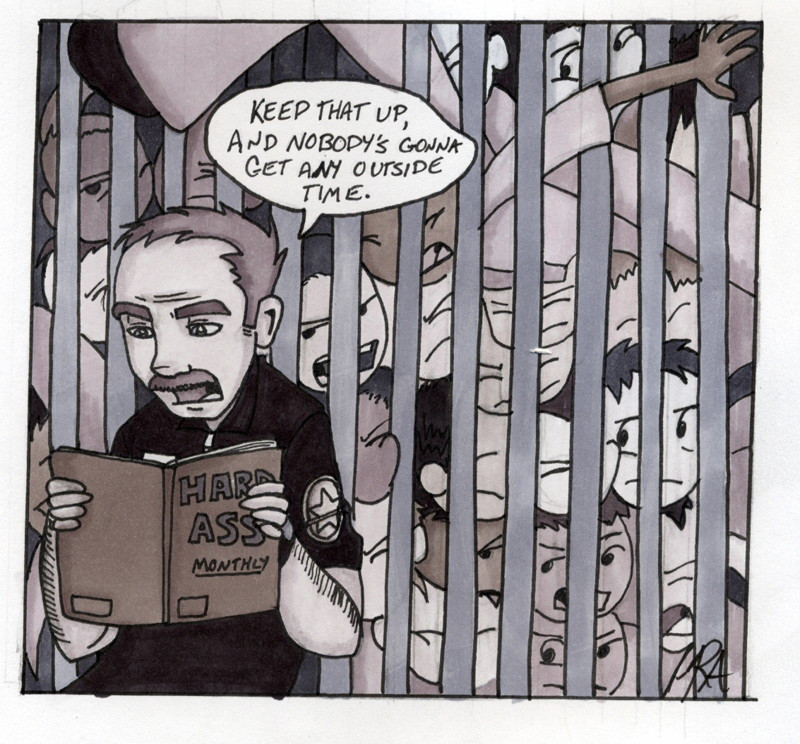Conservatives ignore the evidence when it comes to incarceration
Prison overcrowding has no positive outcome
The federal Conservative government’s recent “tough on crime” legislation is having a pronounced impact on prisons, as crowding among prison populations is becoming a more prevalent problem.
The Correctional Service of Canada expects a 30 per cent increase in the federal prison population as a result of the Tories’ law and order agenda.
The elimination of double time credit, introduction of new mandatory minimum sentences and limitations placed upon the use of conditional sentences have all resulted in more individuals being incarcerated in federal prisons for longer periods of time.
The “tough on crime” movement and prison expansion plan is happening at the same time that crime rates continue to decrease. The Conservative approach to crime is reactionary and ignorant of the research evidence.
Howard Sapers, the federal correctional investigator, recently released his annual report outlining some troubling facts and statistics regarding prison overcrowding.
Many prisons are resorting to double bunking inmates in an attempt to cope with the increasing prison population.
Double bunking means that a cell originally designed for one prisoner now houses two prisoners. Investigators found that an increase in the number of prisoners has led to a 50 per cent increase in the use of double bunking over the past five years.
Double bunking blatantly violates minimum standards of the treatment of prisoners, as determined by the United Nations.
Increases in double bunking can lead to increased tensions, stress and violence in prisons. Inmates in these situations also tend to have limited access to rehabilitative programs.
On any given day in 2009, less than 25 per cent of the federal prison population was enrolled or engaged in core correctional programming. This is a disturbing fact, as participation in core programs is associated with reduced reoffending.
According to Rick Sauve of the prisoner’s group LifeLine, the Conservative government has yet to discuss plans to expand mental health, education or counselling services to accommodate an estimated increase of 4,500 more prisoners over the next five years.
This means that more inmates will likely be released with little rehabilitation, putting them at a greater risk of reoffending. Idleness does not help to produce responsible and productive members of society. Adequate programs and services are essential.
Mass incarceration has had little significant effect on the reduction and prevention of crime and the perceived deterrence of tougher prison sentences remains an un-substantiated claim in research.
For example, look at the United States prison system. The U.S. incarceration rate is increasing, but crime rates are not decreasing. If there was an academically sound relation between increased prison terms and lower crime rates, the U.S. should be one of the safest countries in the world.
Canada is blindly following and implementing failed and expensive policies that won’t accomplish anything positive for society. Getting “tough on crime” has consistently failed to address the root causes of crime, a major factor in preventing crime before it occurs.
Mass incarceration also tends to disproportionately affect the disadvantaged and marginalized in society. This can be clearly observed in Canada, where aboriginals are significantly over-represented within the prisoner population.
The money spent on prison expansions and the higher costs of increasing prison populations could be spent towards mental health services, education, affordable housing, prevention programs and poverty reduction strategies.
If we truly want to reduce prison overcrowding, we need to stop over-emphasizing incarceration and begin utilizing more community-based crime sanctions.
Only those offenders who legitimately pose a danger to the majority of society should be imprisoned. Copying a failed American model of imprisoning more people will not lead to a safer country.
There is no evidence supporting the assumption that it will lead to safer communities.
Brittany Thiessen is the communications officer for the University of Winnipeg Criminal Justice Students’ Association.
Published in Volume 65, Number 12 of The Uniter (November 18, 2010)








